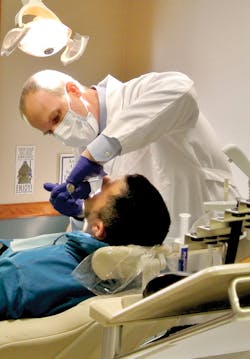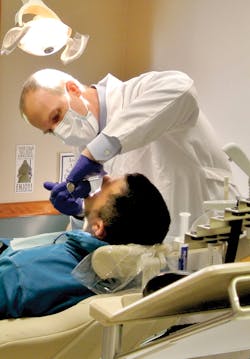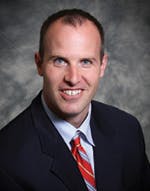The turning point
A yearlong journey to self-actualization: The story of Dr. Bob Lalor
Over the past two decades, we’ve been fortunate to work with dentists from around the country who have overcome extraordinary circumstances. As a company that exists to train teams, coach doctors, and teach practices to overcome hurdles to success, their stories inspire us.
In this bimonthly Dental Economics series, we want to share some of their stories with you. Our hope is that you can identify with these doctors and learn from them—whether you’ve been through something trying already or not. Let these doctors inspire you to create your own “turning point” for success.
—The Scheduling Institute
“When the winds of change blow, some people build walls, others build windmills.”
—Chinese proverb
For Bob Lalor, DDS, surviving the gales that buffeted his Southern New York State family dental practices last year was a testament to 20 years of windmill building. A flood put the basement of a new office in Horseheads under four feet of water. A sign vendor absconded with a $50,000 deposit for a sign that never arrived. Two doctors (the only two) left within days of each other at his busy Creekside office. Then, on top of it all, Dr. Lalor experienced the sudden death of his father, the founder of the Lalor family practices and the Lalor family patriarch.
Yet despite the adversity, Dr. Lalor’s practices turned their most profitable year ever.
“In hindsight, 2017 was truly a turning point year. But in the thick of it, you don’t realize how much so,” Dr. Lalor says. “Our big year had a lot of ups and a lot of downs. And we certainly had to overcome a lot to get our ups.”
For most dental practices, it would have been difficult to recover from any of the unfortunate events that beset Dr. Lalor in 2017. But his practices had been strengthened by hard work, commitment to family, and a philosophy that enabled him to stand tall when others might have fallen. Dr. Lalor attributes part of that philosophy to his father. “My father was a great giver,” he says. “He had a tradition of doing what’s right for every patient and never being judgmental. It can be harder to do on a larger scale, but it’s the right thing to do.”
Bob Lalor, DDS
When his father passed away unexpectedly in December, it provided some peace of mind to Dr. Lalor that he and his father had little unfinished business. Though father and son at times clashed over the more progressive changes Dr. Lalor wished to make, he ultimately earned his father’s trust. “We found we shared some very common goals,” he says. “We always had a very good relationship, and never had a serious conflict.”
In his father’s final years of practice, Dr. Lalor and his father worked on common goals for the future. Then, when his father announced plans for retirement in 2011, Dr. Lalor made preparations to assume the mantle of the family practice. During that time he read the book Great by Choice by Jim Collins to gain inspiration.
Fast forward six years. It was during 2017’s most stressful moments that Dr. Lalor had a serendipitous reunion with the book. He was reminded of one of its key lessons.
“Collins’s book talked about a 20-mile march—not pushing yourself too hard, but continuously marching forward,” he says. “In the margins of the book, I noticed that I had written in the year and a growth target for the next several years based on what I thought would be our best [performance]. It turns out we’ve done far better than what I was thinking. I sold myself short. But if I undertook the same exercise today, I would still estimate the same way. I guess I learned early—don’t try to bet on a big winner. If you expect to hit it out of the park, it’s silly. It’s not totally within our control. But if we make improvements year after year, [we’ll] build lasting success.”
Among those improvements was developing a mindset of self-actualization. Over the past several years, Dr. Lalor worked closely with Jay Geier at Atlanta-based Scheduling Institute to have a better perspective on changes within his practice. For example, that new perspective aided Dr. Lalor when he found his thriving Creekside office without its only two dentists. He and his wife, Mary John, DDS, exchanged panic for resolve, working long hours to fill the gap. In the search for new dentist candidates, Dr. Lalor strategically asked his staff to make recommendations. This ensured that the new dentists would be a fit.
Similarly, when he found himself wading in thigh-deep water in the basement of his almost-finished Horseheads office, Dr. Lalor shifted his thinking. Rather than bemoan his bad fortune, he asked the contractor backfill the basement with six feet of concrete. This turned the basement into a crawl space and ensured flooding would not be a chronic issue.
Dr. Lalor credits his father, Geier, and other mentors for their foundational impact on his life and career. Drawing inspiration from these individuals, he developed a three-part philosophy that he believes anyone can employ to create a turning point in a practice or a career.
First, he says, is to be purposeful. “You have to know what you want on the other side,” he says. “You have to be clear about the real intent of your actions when you are undergoing troubles and challenges. There’s a lot of clarity in that.”
Next is to have your priorities in order and be clear about what is most important to you. Too many practitioners run the business with a “bet the house” mentality, but dentists who put patients and family first will always be able to manage their way out of a sticky situation. “If you work a little harder, you can overcome,” he says. “I knew that my challenges weren’t going to affect my family.”
Finally, Dr. Lalor believes in developing great leaders within his practice. He feeds off the energy from his young leadership team, and vice versa. Following Geier’s advice, Dr. Lalor preaches transparency as a requirement of leading. He consistently hosts weekly leadership meetings and quarterly retreats, both to troubleshoot urgent needs and be forward-thinking about issues that could affect the practice.
Today, Dr. Lalor stands tall as the leader of his business. When he went to work in 2018, he did so for the first time without the looming influence of his father. But the legacy of Dr. Lalor’s father—or “Doc,” as he was known—lives on. It includes programs dating back to his father’s first practice in 1964, such as “Free Dental Day” for citizens who can’t afford care. There’s also a tradition of never letting a patient suffer overnight, even if it means working after-hours or on weekends to address an issue.
Dr. Lalor summarizes his good fortune and ability to overcome problems this way: “When people try to say we’re an overnight success, I say, ‘Well, we’re a 20-year overnight success.’ It’s just a good habit of doing the same things consistently. For me, that means that a good month doesn’t make me as excited and a bad month doesn’t make me as depressed as it would for some others. You get hardened to those amplitudes a bit better.”
Editor’s note: The Scheduling Institute would like to thank Jordan Bressler for his contributions to this article.


